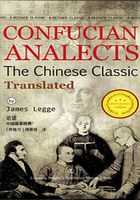
CHAPTER 15
1. The Master said, "Sin, my doctrine is that of an all-pervading unity." The disciple Tsăng replied, "Yes."
2. The Master went out, and the other disciples asked, saying,
12. THE CONSEQUENCE OF SELFISH CONDUCT.放, up.2d tone,=依, 'to accord with', 'to lie alongside'.—'He who acts along the line of gain.'
13. THE INFLUENCE IN GOVERNMENT OF CEREMONIES OBSERVED IN THEIR PROPER SPIRIT. 礼让字是二是一, i.e., they are a hendiadys. 让=礼之实, 'the sincer. and sub. Of cer.', the spirit of it, as we should say. Comp. 和 in L.12. 为=治, 'to govern'. This mean. is found in the Dict. 如礼何, see III.3.
14. ADVISING TO SELF-CUTIVATION. Comp. I. 16. Here, as there, 不not being imper. we must supply a nominative. 位, 'a place', i.e. an official situation. 所以立 is to be completed 所以立乎其位.
15. CONFUCIUS'S DOCTRINE THAT OF A PERVADING UNITY. This chap. is said to be the most profound in the Lun Yu. 1. 吾道一以贯之;—To myself it occurs to translate, 'my doctrines have one thing which goes thro. them, ' but such an expos. has not been approved by any Chin. comm. 一以贯之 are made to contain the copula and predicate of 吾道, and 之, it is said, 指万事万物, 'refers to all affairs and all things'. The 2d par. shows us clearly enough what the one thing or unity intended by Conf. was. It was the heart, man's nature, of which all the relations and duties of life are only the development and outgoings. 忠and 恕, which seem to be two things, and both formed from心, 'the heart', 忠 being compounded of 中, 'middle', 'centre', and心, and 恕 of 如 'as', and 心. The 'centre heart'=I, the ego, and the 'as heart'=the I in sympathy with others. 忠 is duty-doing, on a consideration, or from the impulse, of one's own self; 恕 is duty doing, on the principle of reciprocity. The ch. is important, showing that Conf. only claimed to unfold and enforce duties indicated by man's mental constitution. He was simply a moral philosopher. Obs. 唯, up.2d tone,= 'yes'. Some say that 门人 must mean Tsang's own disciples, and that had they been those of Conf., we should have read 弟子. The criticism can't be depended on. 而已矣 is a very emphatic—'and nothing more'.

"What do his words mean?" Tsăng said, "The doctrine of our master is to be true to the principles of our nature and the benevolent exercise of them to others,—this and nothing more."